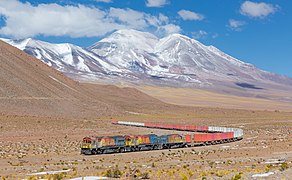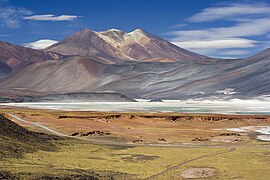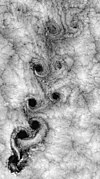| Main page | Assessment | Articles | Templates | Translation | Noticeboard | To Do List | Portal |
The Chile Portal

Chile, officially the Republic of Chile, is a country in western South America. It is the southernmost country in the world and the closest to Antarctica, stretching along a narrow strip of land between the Andes Mountains and the Pacific Ocean. Chile had a population of 17.5 million as of the latest census in 2017 and has a territorial area of 756,102 square kilometers (291,933 sq mi), sharing borders with Peru to the north, Bolivia to the northeast, Argentina to the east, and the Drake Passage to the south. The country also controls several Pacific islands, including Juan Fernández, Isla Salas y Gómez, Desventuradas, and Easter Island, and claims about 1,250,000 square kilometers (480,000 sq mi) of Antarctica as the Chilean Antarctic Territory. The capital and largest city of Chile is Santiago, and the national language is Spanish.
Spain conquered and colonized the region in the mid-16th century, replacing Inca rule, but failed to conquer the independent Mapuche people who inhabited what is now south-central Chile. Chile emerged as a relatively stable authoritarian republic in the 1830s after their 1818 declaration of independence from Spain. During the 19th century, Chile experienced significant economic and territorial growth, putting an end to Mapuche resistance in the 1880s and gaining its current northern territory in the War of the Pacific (1879–83) by defeating Peru and Bolivia. In the 20th century, up until the 1970s, Chile underwent a process of democratization and experienced rapid population growth and urbanization, while relying increasingly on exports from copper mining to support its economy. During the 1960s and 1970s, the country was marked by severe left-right political polarization and turmoil, which culminated in the 1973 Chilean coup d'état that overthrew Salvador Allende's democratically elected left-wing government. This was followed by a 16-year right-wing military dictatorship under Augusto Pinochet, which resulted in more than 3,000 deaths or disappearances. The regime ended in 1990, following a referendum in 1988, and was succeeded by a center-left coalition, which ruled until 2010.
Chile is a developing country with a high-income economy and is one of the most economically and socially stable nations in South America. Chile also performs well in the region in terms of sustainability of the state and democratic development. Chile is a founding member of the United Nations, the Community of Latin American and Caribbean States (CELAC), and the Pacific Alliance, and joined the OECD in 2010. (Full article...)

José María Caro Martínez[a] (Spanish pronunciation: [xoˈse maˈɾia ˈkaɾo maɾˈtineθ] ; 1830 – 11 November 1916) was a Chilean politician and civil servant. In May 1894, he was unanimously elected as the first mayor of the commune of Pichilemu, with Pedro Nolasco de Mira and Francisco Reyes made second and third magistrate respectively. Caro Martínez had previously served for several years as administrator or llavero of the San Antonio de Petrel hacienda and, between 1891 and 1892, was the Subdelegate of the 13th Subdelegation of San Fernando Department which comprised the district of Cáhuil.
The eleven-year mayorship of Caro Martínez, which lasted from 1894 and 1905, was described by journalist and local historian José Arraño Acevedo as "the most fruitful" in the history of the commune. In his four terms, Caro Martínez built roads connecting Pichilemu and San Fernando, capital of the department of the same name, and founded several schools in Pichilemu and parts of current Marchigüe. (Full article...)
Selected biography -
Salvador Guillermo Allende Gossens (26 June 1908 – 11 September 1973) was a Chilean socialist politician who served as the 28th president of Chile from 1970 until his death in 1973. As a socialist committed to democracy, he has been described as the first Marxist to be elected president in a liberal democracy in Latin America. Allende's involvement in Chilean politics spanned a period of nearly forty years, during which he held various positions including senator, deputy, and cabinet minister. As a life-long committed member of the Socialist Party of Chile, whose foundation he had actively contributed to, he unsuccessfully ran for the national presidency in the 1952, 1958, and 1964 elections. In 1970, he won the presidency as the candidate of the Popular Unity coalition in a close three-way race. He was elected in a run-off by Congress, as no candidate had gained a majority. In office, Allende pursued a policy he called "The Chilean Path to Socialism". The coalition government was far from unanimous. Allende said that he was committed to democracy and represented the more moderate faction of the Socialist Party, while the radical wing sought a more radical course. Instead, the Communist Party of Chile favored a gradual and cautious approach that sought cooperation with Christian democrats, which proved influential for the Italian Communist Party and the Historic Compromise.
As president, Allende sought to nationalize major industries, expand education, and improve the living standards of the working class. He clashed with the right-wing parties that controlled Congress and with the judiciary. On 11 September 1973, the military moved to oust Allende in a coup d'état supported by the CIA, which initially denied the allegations. In 2000, the CIA admitted its role in the 1970 kidnapping of General René Schneider who had refused to use the army to stop Allende's inauguration. Declassified documents released in 2023 showed that US president Richard Nixon, his national security advisor Henry Kissinger, and the United States government, which had branded Allende as a dangerous communist, were aware of the military's plans to overthrow Allende's democratically elected government in the days before the coup d'état. (Full article...)
Selected article -

A referendum on whether Augusto Pinochet, the head of a military dictatorship, should become president for eight years under resumed civilian rule was held in Chile on 5 October 1988. The "No" side won with 56% of the vote, marking the end of Pinochet's 16+1⁄2-year rule. Democratic elections were held in 1989, leading to the establishment of a new government in 1990. (Full article...)
General images
Did you know (auto generated)

- ... that Peruvian foreign minister Manuel María Gálvez Egúsquiza was arrested by Chilean troops for refusing to sign peace with the cession of territory during the War of the Pacific?
- ... that Salar de Pedernales in Chile features dark slope streaks resembling dark slope streaks on Mars?
- ... that the Peruvian Civil Guard officer Mariano Santos Mateo was nicknamed the Brave Man of Tarapacá because he captured a banner of a Chilean military unit during the Battle of Tarapacá?
- ... that Earle M. Chiles, a businessman and philanthropist from Portland, Oregon, was also a senator of the board of Ludwig Maximilian University in Munich, Germany?
- ... that Daniela Ceballos worked with the Football Federation of Chile to supervise safety protocols during the COVID-19 pandemic while playing football herself?
- ... that Angelito de Canal 13, the mascot of the Chilean television network Canal 13, was inspired by its creator's son?
Topics
Categories
Recognized content
| This is a list of recognized content, updated weekly by JL-Bot (talk · contribs) (typically on Saturdays). There is no need to edit the list yourself. If an article is missing from the list, make sure it is tagged (e.g. {{WikiProject Chile}}) or categorized correctly and wait for the next update. See WP:RECOG for configuration options. |
Featured articles
- Chilean battleship Almirante Latorre
- Almirante Latorre-class battleship
- Cerro Azul (Chile volcano)
- Calabozos
- El Tatio
- Chilean cruiser Esmeralda (1883)
- Guallatiri
- Hudson Volcano
- Laguna del Maule (volcano)
- Mothers of the Disappeared
- Ojos del Salado
- Pali-Aike volcanic field
- Pisco sour
- South American dreadnought race
- Taapaca
Good articles
- 2010 Pichilemu earthquakes
- 2018 Santiago ePrix
- Agustín Ross Cultural Centre
- Angata
- Los Ángeles Negros
- Apacheta-Aguilucho volcanic complex
- Argentine–Chilean naval arms race
- Atamu Tekena
- Orlando Bosch
- Lorenza Böttner
- Sara Braun
- Monte Burney
- Battle of Caldera Bay
- Felipe Camiroaga
- Chilean battleship Capitán Prat
- Carménère
- José María Caro Martínez
- Chile at the 2014 Winter Paralympics
- Coat of arms of Pichilemu
- Dutch expedition to Valdivia
- El Laco
- El Negrillar
- Milton Friedman
- Fueguino
- Irruputuncu
- Laguna Miscanti
- Laguna del Negro Francisco
- Lascar (volcano)
- Lastarria
- Lazufre
- Licancabur
- Licancabur Lake
- Llullaillaco
- Nevado de Longaví
- Manuel Foster Observatory
- Monturaqui
- Irene Morales
- John Thomas North
- Obligation to Negotiate Access to the Pacific Ocean
- Olca-Paruma
- USS Oneota (1864)
- La Pacana
- Parinacota (volcano)
- Patio 29
- Pichilemu
- Colegio de la Preciosa Sangre de Pichilemu
- Salar de Punta Negra
- Reclus (volcano)
- Murders of María José Reyes and Juan Duarte
- Sammis Reyes
- Riro Kāinga
- Sairecabur
- Salar Ignorado
- San Pedro (Chile volcano)
- Socompa
- Sollipulli
- Tacora
- Tilocálar
- Nevado Tres Cruces
- Tupungatito
- Tuyajto Lake
Featured pictures
-
360-degree Panorama of the Southern Sky edit
-
A 360 degree panorama of a unique cloudscape over La Silla
-
Culpeo MC
-
FCAB EMD GT22CU-3 San Pedro - Ascotan
-
Laguna Miñiques, Chile, 2016-02-08, DD 33-38 PAN
-
Laser Towards Milky Ways Centre
-
Miscanti Lagoon near San Pedro de Atacama Chile Luca Galuzzi 2006
-
Moai Rano raraku
-
SQM GE 289A Boxcab Carmelita - Reverso
-
Volcán San Pedro, Chile, 2016-02-09, DD 18
-
Vortex-street-1
WikiProjects
Related portals
New articles
Rules | Match log | Results page (for watching) | Last updated: 2024-10-22 20:01 (UTC)
Note: The list display can now be customized by each user. See List display personalization for details.
- Chile men's national under-15 and under-16 basketball team (edit | talk | history | links | watch | logs | tools) by Maiō T. (talk · contribs · new pages (59)) started on 2024-10-22, score: 31
- Mateo Flores (footballer) (edit | talk | history | links | watch | logs | tools) by BrazilianDude70 (talk · contribs · new pages (41)) started on 2024-10-22, score: 18
- Francisco Pichott (edit | talk | history | links | watch | logs | tools) by Pietaster (talk · contribs · new pages (36)) started on 2024-10-22, score: 43
- Arturo Villasanti (edit | talk | history | links | watch | logs | tools) by BrazilianDude70 (talk · contribs · new pages (41)) started on 2024-10-21, score: 23
- Iquique military school shooting (edit | talk | history | links | watch | logs | tools) by AgeOfPlastic (talk · contribs · new pages (2)) started on 2024-10-21, score: 37
- Erwin Durán (edit | talk | history | links | watch | logs | tools) by BrazilianDude70 (talk · contribs · new pages (41)) started on 2024-10-21, score: 67
- REBELS-25 (edit | talk | history | links | watch | logs | tools) by Arwenz (talk · contribs · new pages (59)) started on 2024-10-09, score: 16
- La Sociedad Interamericana de Astronomía en la Cultura (edit | talk | history | links | watch | logs | tools) by Beaky15 (talk · contribs · new pages (1)) started on 2024-10-21, score: 14
- Odete Domingos (edit | talk | history | links | watch | logs | tools) by Pietaster (talk · contribs · new pages (36)) started on 2024-10-21, score: 14
- Alejandro Azócar (edit | talk | history | links | watch | logs | tools) by ImSnot (talk · contribs · new pages (3)) started on 2024-10-20, score: 49
- Kildonan Lifeboat Station (edit | talk | history | links | watch | logs | tools) by Ojsyork (talk · contribs · new pages (12)) started on 2024-10-19, score: 14
- Paralomis tuberipes (edit | talk | history | links | watch | logs | tools) by TheTechnician27 (talk · contribs · new pages (75)) started on 2024-10-18, score: 31
- Southern Zone Sea (edit | talk | history | links | watch | logs | tools) by Janitoalevic (talk · contribs · new pages (5)) started on 2024-10-18, score: 16
- Dispute over the extended continental shelf in the Southern Zone Sea between Argentina and Chile (edit | talk | history | links | watch | logs | tools) by Janitoalevic (talk · contribs · new pages (5)) started on 2024-10-18, score: 31
- List of Kim Woojin concert tours (edit | talk | history | links | watch | logs | tools) by RachelTensions (talk · contribs · new pages (26)) started on 2024-10-17, score: 14
- 2018 FIBA U15 Women's South American Championship (edit | talk | history | links | watch | logs | tools) by Maiō T. (talk · contribs · new pages (59)) started on 2024-10-16, score: 31
- Rincón Chileno (edit | talk | history | links | watch | logs | tools) by CurryTime7-24 (talk · contribs · new pages (8)) started on 2024-10-15, score: 21
- The Moment: A Minor (edit | talk | history | links | watch | logs | tools) by RachelTensions (talk · contribs · new pages (26)) started on 2024-10-15, score: 14
- CRUZEX (edit | talk | history | links | watch | logs | tools) by TheFrenchKing (talk · contribs · new pages (5)) started on 2024-10-14, score: 15
- Menichetti (edit | talk | history | links | watch | logs | tools) by Roastedbeanz1 (talk · contribs · new pages (100)) started on 2024-10-12, score: 30
- David Fleischer (judge) (edit | talk | history | links | watch | logs | tools) by Smasongarrison (talk · contribs · new pages (212)) started on 2024-10-12, score: 31
- Tessa Jopp (edit | talk | history | links | watch | logs | tools) by Lachie23 (talk · contribs · new pages (4)) started on 2024-10-12, score: 14
- Roberto Rojas (edit | talk | history | links | watch | logs | tools) by Sekundenlang (talk · contribs · new pages (1)) started on 2024-10-11, score: 43
- Jaime Aránguiz (edit | talk | history | links | watch | logs | tools) by Fanminton (talk · contribs · new pages (14)) started on 2024-10-10, score: 43
- Scha (edit | talk | history | links | watch | logs | tools) by Bkonrad (talk · contribs · new pages (9)) started on 2024-10-10, score: 16
- List of bi-metallic coins (edit | talk | history | links | watch | logs | tools) by Tatsnorad (talk · contribs · new pages (1)) started on 2024-10-10, score: 16
- Giorgio Mautino (edit | talk | history | links | watch | logs | tools) by Pietaster (talk · contribs · new pages (36)) started on 2024-10-09, score: 14
- Margarita Grun (edit | talk | history | links | watch | logs | tools) by Pietaster (talk · contribs · new pages (36)) started on 2024-10-09, score: 14
- Alejandro Krauss (edit | talk | history | links | watch | logs | tools) by Pietaster (talk · contribs · new pages (36)) started on 2024-10-09, score: 37
- 2013 Zacatecas state elections (edit | talk | history | links | watch | logs | tools) by Reading Beans (talk · contribs · new pages (59)) started on 2024-10-09, score: 18
- Southern house wren (edit | talk | history | links | watch | logs | tools) by Aa77zz (talk · contribs · new pages (14)) started on 2024-10-09, score: 16
- Celso de Moraes (edit | talk | history | links | watch | logs | tools) by Pietaster (talk · contribs · new pages (36)) started on 2024-10-09, score: 14
- Ourisia serpyllifolia (edit | talk | history | links | watch | logs | tools) by Stitchbird2 (talk · contribs · new pages (2)) started on 2024-10-09, score: 43
- Maya Stein (edit | talk | history | links | watch | logs | tools) by McKay (talk · contribs · new pages (1)) started on 2024-10-09, score: 31
- Benjamín Chandía (edit | talk | history | links | watch | logs | tools) by ImSnot (talk · contribs · new pages (3)) started on 2024-10-09, score: 31
- José Carlos Jacques (edit | talk | history | links | watch | logs | tools) by Pietaster (talk · contribs · new pages (36)) started on 2024-10-08, score: 14
- Luis Alberto Schneider (edit | talk | history | links | watch | logs | tools) by Pietaster (talk · contribs · new pages (36)) started on 2024-10-08, score: 57
- Juan Fernandez Women's Group (edit | talk | history | links | watch | logs | tools) by Lajmmoore (talk · contribs · new pages (12)) started on 2024-10-07, score: 16
- Edmond A. Grin (edit | talk | history | links | watch | logs | tools) by TardigradeRoadtrip (talk · contribs · new pages (1)) started on 2024-09-28, score: 16
- Álvaro Prenafeta (edit | talk | history | links | watch | logs | tools) by Pietaster (talk · contribs · new pages (36)) started on 2024-10-08, score: 37
Associated Wikimedia
The following Wikimedia Foundation sister projects provide more on this subject:
-
Commons
Free media repository -
Wikibooks
Free textbooks and manuals -
Wikidata
Free knowledge base -
Wikinews
Free-content news -
Wikiquote
Collection of quotations -
Wikisource
Free-content library -
Wikiversity
Free learning tools -
Wikivoyage
Free travel guide -
Wiktionary
Dictionary and thesaurus
- ^ In this Spanish name, the first or paternal surname is Caro and the second or maternal family name is Martínez.






















































